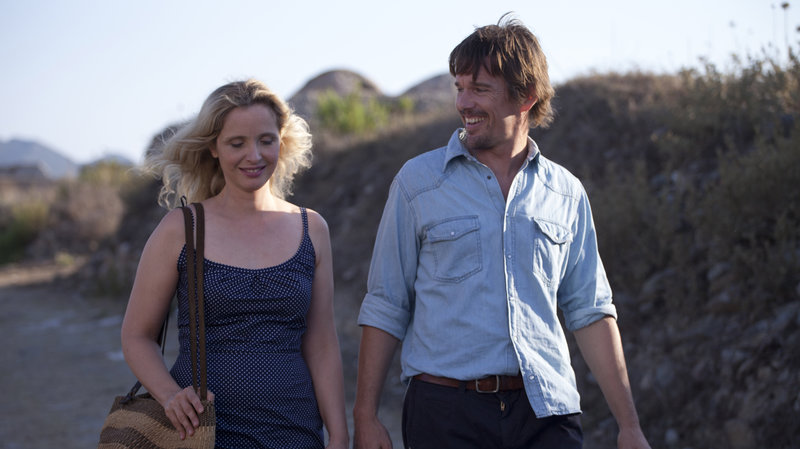The Best Movies of 2013, #4: Blue Is the Warmest Color

Falling in love is magical, but what happens when the fall ends? Do you land gently and continue through life in a state of perpetual bliss? Or do you crash and suddenly find yourself helpless, paralyzed with numbness and confusion? Blue Is the Warmest Color, Abdellatif Kechiche’s soaring, searing story of love won and lost, examines the trajectory of a fairly typical relationship with atypical tenderness and honesty. In so doing, it runs the emotional gamut, depicting fully realized characters at their best and worst: joyous and disconsolate, hopeful and afraid, empathetic and hurtful. But even as it buffets its two lovers through emotional crosswinds, one thing remains constant: It always feels true. It is not an especially happy film, and viewers who demand that their protagonists prevail may leave disappointed. Yet Blue Is the Warmest Color is also deeply compassionate, one of the most swooningly romantic movies in recent memory. It lifts you up and intoxicates you, even as it shatters your heart.
Not that it is in any rush to advertise its greatness. It opens on Adèle (Adèle Exarchopoulos, stunning), exiting her modest home and loping to catch the bus to school, one of many mundane moments grounding a movie that otherwise spends a great deal of time up in the clouds. With an expressive, open face and wisps of brown hair that frequently whip across her brow, Adèle is a fairly normal 15-year-old. She works hard in school, gossips with her gaggle of friends, tentatively approaches boys, and—imagine this—has a healthy relationship with her supportive parents. But one day, Adèle strolls past Emma (Léa Seydoux), and the two catch each other’s eye. It’s an innocuous enough encounter (though it apparently took over 100 takes before Kechiche was satisfied), but Adèle soon finds herself besotted, dreaming of this blue-haired figure to the point that her sexual encounters with men feel hollow. She initially channels her fantasies by pursuing a relationship with an adventurous female friend, but that quickly backfires, at which point she seems truly lost. Read More


 Slavery was horrible. This is not up for debate; it’s a fact. Yet our discussion of this wretched time in our civilization tends to feel removed and academic. How, we wonder, could society have countenanced the suppression of an entire race? What forces could have conspired to treat people as nothing more than property? Was nineteenth-century America motivated by economic gain, rationalizing that the ends justified the means, or did slave owners honestly believe in racial superiority? These are questions worth asking, lest such horrid history repeat itself, but they approach slavery more as an intellectual concept than as the actual, systemic brutalization of humans. 12 Years a Slave—Steve McQueen’s gripping, unapologetically savage account of one servant’s struggles—bucks that trend and instead takes a hauntingly intimate approach. It is not about slavery’s politics. It is about its mechanics.
Slavery was horrible. This is not up for debate; it’s a fact. Yet our discussion of this wretched time in our civilization tends to feel removed and academic. How, we wonder, could society have countenanced the suppression of an entire race? What forces could have conspired to treat people as nothing more than property? Was nineteenth-century America motivated by economic gain, rationalizing that the ends justified the means, or did slave owners honestly believe in racial superiority? These are questions worth asking, lest such horrid history repeat itself, but they approach slavery more as an intellectual concept than as the actual, systemic brutalization of humans. 12 Years a Slave—Steve McQueen’s gripping, unapologetically savage account of one servant’s struggles—bucks that trend and instead takes a hauntingly intimate approach. It is not about slavery’s politics. It is about its mechanics. As wonderful as it is to watch, American Hustle was assuredly a difficult film to make. It has a labyrinthine plot, replete with double crosses, false identities, fake accents, and cons nested inside other cons. Its structure is ungainly, with cascading flashbacks, multiple voiceovers, and repeated shifts in point of view. And its based-in-truth narrative, about the FBI’s ABSCAM sting in the 1970s, is laden with insider minutiae, ranging from the mechanics of organized crime to the breadth of political corruption to the egotism of law enforcement. You would think, given the need to balance all of these plates spinning on screen, that American Hustle would require a workmanlike and disciplined director, someone capable of streamlining the screenplay’s disparate elements and synthesizing its busy plot. Instead, it got David O. Russell.
As wonderful as it is to watch, American Hustle was assuredly a difficult film to make. It has a labyrinthine plot, replete with double crosses, false identities, fake accents, and cons nested inside other cons. Its structure is ungainly, with cascading flashbacks, multiple voiceovers, and repeated shifts in point of view. And its based-in-truth narrative, about the FBI’s ABSCAM sting in the 1970s, is laden with insider minutiae, ranging from the mechanics of organized crime to the breadth of political corruption to the egotism of law enforcement. You would think, given the need to balance all of these plates spinning on screen, that American Hustle would require a workmanlike and disciplined director, someone capable of streamlining the screenplay’s disparate elements and synthesizing its busy plot. Instead, it got David O. Russell. Before Sunrise was never supposed to start a franchise. A touching, wondrous glimpse of two people meeting and immediately falling in love, Richard Linklater’s 1995 romance worked perfectly well as a standalone story of a single night, even if the tantalizing ambiguity of its ending—in which nascent lovers Jesse (Ethan Hawke) and Celine (Julie Delpy) agreed to meet again in Vienna in six months’ time—left viewers speculating as to what happened next. But to our surprise, Linklater resumed their story in 2004 with Before Sunset, which reunited Jesse and Celine for a few fateful hours in Paris. As it turned out, logistical issues prevented the lovers from reconnecting in Vienna, but even after nine years, their chemistry still crackled, and Before Sunset concluded with the winsome suggestion that they might in fact live happily ever after. Did they? To answer that question, Linklater and his two leads (who, for this film and the last, are also his writing partners) have returned with Before Midnight, which shatters our fairytale expectations with stark realism and painful honesty. Jesse and Celine may yet find bliss, but as this movie makes ruthlessly clear, it won’t be easy.
Before Sunrise was never supposed to start a franchise. A touching, wondrous glimpse of two people meeting and immediately falling in love, Richard Linklater’s 1995 romance worked perfectly well as a standalone story of a single night, even if the tantalizing ambiguity of its ending—in which nascent lovers Jesse (Ethan Hawke) and Celine (Julie Delpy) agreed to meet again in Vienna in six months’ time—left viewers speculating as to what happened next. But to our surprise, Linklater resumed their story in 2004 with Before Sunset, which reunited Jesse and Celine for a few fateful hours in Paris. As it turned out, logistical issues prevented the lovers from reconnecting in Vienna, but even after nine years, their chemistry still crackled, and Before Sunset concluded with the winsome suggestion that they might in fact live happily ever after. Did they? To answer that question, Linklater and his two leads (who, for this film and the last, are also his writing partners) have returned with Before Midnight, which shatters our fairytale expectations with stark realism and painful honesty. Jesse and Celine may yet find bliss, but as this movie makes ruthlessly clear, it won’t be easy.